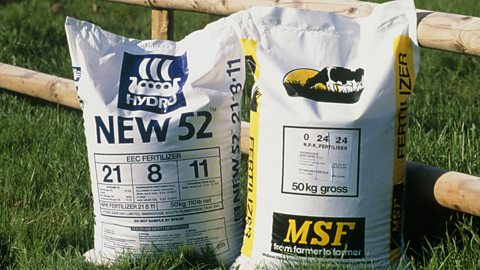Fertilisers
Fertilisers are necessary for good supplies of healthy crops to be grown in order to meet the demands of our growing population. Just like we need a good diet to grow in a healthy way, plants and crops also require the correct nutrients.
Plant nutrients
There are three essential plant nutrients for healthy growth:
- nitrogen (N)
- phosphorous (P)
- potassium (K)
Fertilisers contain one or more of these nutrients and different crops require different proportions of each of the three. For the fertiliser to be effective, it must be soluble so that it can reach the plantÔÇÖs roots.
Natural or synthetic?
Natural fertilisers are substances that are obtained from plant and animal waste. Nutrients in the soil grow into crops creating plant protein. This plant protein either dies, or is eaten by animals. When animals produce waste, the nutrients return to the soil.
Step one
Step two
Step three
Step four
Compost and manure are both the products of plant and animal death and decay. While they both return nutrients to the soil, they are not always the most efficient fertilisers.

Synthetic fertilisers are made by chemists. They can be made by neutralisation reactions and can be designed with a specific crop in mind. The percentage proportions of each of the three essential nutrients are often shown as three numbers on the fertiliser bag.
Some examples of synthetic fertilisers are shown in the table below.
| Synthetic fertiliser | Formula |
| Ammonium nitrate | NH4NO3 |
| Ammonium phosphate | (NH4)3PO4 |
| Ammonium sulfate | (NH4)2SO4 |
| Urea | (NH2)2CO |
| Potassium nitrate | KNO3 |
| Synthetic fertiliser | Ammonium nitrate |
|---|---|
| Formula | NH4NO3 |
| Synthetic fertiliser | Ammonium phosphate |
|---|---|
| Formula | (NH4)3PO4 |
| Synthetic fertiliser | Ammonium sulfate |
|---|---|
| Formula | (NH4)2SO4 |
| Synthetic fertiliser | Urea |
|---|---|
| Formula | (NH2)2CO |
| Synthetic fertiliser | Potassium nitrate |
|---|---|
| Formula | KNO3 |